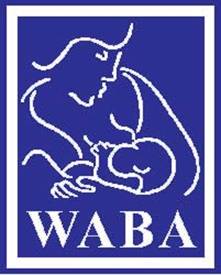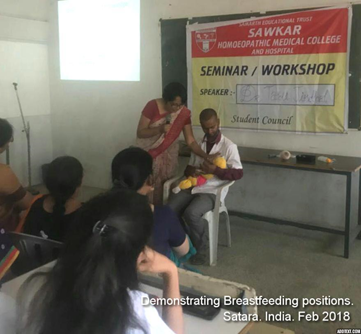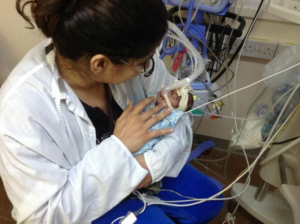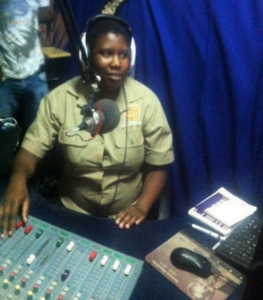Empower Everyone: Breastfeeding and the Transformation of Women’s Lives
 Scaling up breastfeeding could prevent 823,000 annual deaths in children under 5 years and 20,000 annual deaths from breast cancer among other well documented benefits1. Breastfeeding also provides a strong foundation for the economic empowerment of families throughout the world. In addition to improving maternal and child health, supporting recommended breastfeeding practices could save an estimated USD 302 billion globally each year. Despite these facts and statistics, many women are unable to optimally breastfeed due to a lack of consistent information and support during the 1000-day (pregnancy to the child’s second birthday) continuum of care across health, community and workplace sectors2. Empowerment of mothers is an important factor for continuing breastfeeding. Empowering women results in the improved quality of their maternal role and decreases the psychological distress of their families3. Consistent support for mothers across the 1000 days has been shown to be effective in increasing the duration and exclusivity of breastfeeding4. Breastfeeding is not solely a woman’s issue – the protection, promotion and support of breastfeeding is a collective social responsibility.
Scaling up breastfeeding could prevent 823,000 annual deaths in children under 5 years and 20,000 annual deaths from breast cancer among other well documented benefits1. Breastfeeding also provides a strong foundation for the economic empowerment of families throughout the world. In addition to improving maternal and child health, supporting recommended breastfeeding practices could save an estimated USD 302 billion globally each year. Despite these facts and statistics, many women are unable to optimally breastfeed due to a lack of consistent information and support during the 1000-day (pregnancy to the child’s second birthday) continuum of care across health, community and workplace sectors2. Empowerment of mothers is an important factor for continuing breastfeeding. Empowering women results in the improved quality of their maternal role and decreases the psychological distress of their families3. Consistent support for mothers across the 1000 days has been shown to be effective in increasing the duration and exclusivity of breastfeeding4. Breastfeeding is not solely a woman’s issue – the protection, promotion and support of breastfeeding is a collective social responsibility.
The International Women’s Day 2018 theme “Time is Now: Rural and urban activists transforming women’s lives” gives us cause to reflect on the diverse stories of breastfeeding activists. We share some of them with you here.
In India, Dr. Taru turns knowledge into power for expectant mothers – and those who care for them
“One mother following the Facebook post, got inspired to breastfeed her baby who was going to be born by surrogacy. With help, she has now started producing milk, one and a half months before the arrival of her baby!”
Dr. Taru Jindal is an obstetrician and a lactation consultant in Mumbai, India. She recognises that most cases of lactation failure in different parts of India start when a pregnant woman is already in the hospital about to give birth.
Dr. Taru believes health professionals lack adequate training to prioritise breastfeeding in patients. She believes medical and nursing curricula need to be urgently revised to reflect the public health benefits of breastfeeding. In the populous metropolis of Mumbai, Dr. Taru has made it her mission to raise awareness among health professionals about their role in supporting women as they prepare to welcome their newborn into the world. In the last 6 months, she has reached more than 1400 health professionals through trainings and lectures designed to heighten awareness of their roles as frontline breastfeeding advocates. Her Facebook page, Lactation Matters, converts scientific facts into simple language to help educate and mobilise doctors, nurses and mothers.
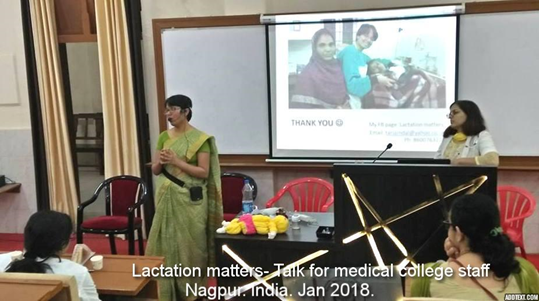
Lactation matters- Medical college staff in Nagpur, Maharashtra state, India, attend one of Dr. Taru Jindal’s trainings
In the Middle East, Dr. Khalid promotes breastfeeding for premature babies
“We are proud to support all mothers who provide breastmilk regularly and practice kangaroo mother care that plays a vital role in saving lives of tiny premature babies who are at the edge of survival. “
Dr. Khalid Iqbal is a neonatologist and lactation consultant in Dubai, United Arab Emirates. He founded Breastmilk is a Medicine, an exclusive initiative for mothers of premature babies.
From the onset of the postnatal period, mothers with premature babies receive counselling and support to encourage them to produce breastmilk. They are equipped to cope with the anxiety brought on by preterm delivery, and receive ongoing professional guidance to continue and maintain production of breastmilk. Kangaroo Mother Care (skin-to-skin contact) techniques are concurrently taught. Almost all the premature babies enrolled in Dr. Khalid’s initiative received breastmilk, with some determined mothers even acquiring breastmilk from friends and family. Harsha, a woman who had infertility issues for a decade, gave birth to a severely premature baby girl, Nia, weighing just under one kilogram at birth. Nia’s chances of survival were slim. Through counselling and ongoing support from Dr. Khalid and his staff, Harsha managed to breastfeed Nia who is a thriving four-year old today.
Zypo champions breastfeeding among pregnant teens and young women in Zimbabwe
“With 82% of the population having access to the internet, I hope projects that use Information and Communications Technology tools such as an app and various multimedia can be utilised by mothers when they cannot access a physical health centre. This can be a new way to reach out to young breastfeeding mothers.”
Nozipho Zypo Moyo is a passionate Sexual and Reproductive Health Rights community activist in Bulawayo, Zimbabwe. She is particularly disappointed that currently 68% of young mothers between the ages of 15 and 35 in Zimbabwe choose not to breastfeed due to a lack of sociocultural support.
Despite the Zimbabwean Ministry of Health’s strong policy protections for breastfeeding, Zypo points out that there is a significant lack of promotion and support. She argues that these are key for a demographic influenced by the media, public opinions and attitudes. During World Breastfeeding Week 2017, Zypo launched physical and virtual spaces that focused on the promotion and support of breastfeeding for young women. The Breastfeeding Champions Initiative is a physical space with 30 staff and volunteers (dubbed ‘champions’) serving 29 local wards throughout Bulawayo. They visit community centres and places of worship offering support like access to information and referrals for young and unwed women and girls. Women and girls enrolled in the initiative receive weekly text messages to aid them through pregnancy and make informed infant feeding decisions after they give birth.
Perhaps the most effective strategy Zypo and the Breastfeeding Champions Initiative employed was its media campaign, garnering a 30-minute weekly radio show on Skyz FM sponsored by the National AIDS Council Bulawayo. Skyz FM reaches an audience of 1.2 million people. Zim TV, with a broadcast viewership of 8 million featured primetime coverage on issues dealing with young mothers and breastfeeding. By public demand, Zypo and her Champions now make monthly television appearances, delivering their key messages to support and promote breastfeeding in 15 local languages.
In Viet Nam, Dr. Tran empowers men to support breastfeeding
“One mother in Pha Lai township told a village health worker that she was surprised that her husband changed so quickly. When they had the first child, he did not care much about his wife and breastfeeding. But now he pays more attention and care to both his wife and the second baby, although the second is also a female”.
Dr. Tran Huu Bich is an epidemiologist at the Hanoi School of Public Health. He is a pioneer in promoting the role of fathers in child nutrition and development in Viet Nam.
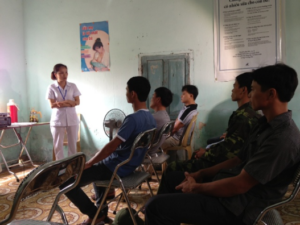
Fathers’ group counselling sessions on breastfeeding at a community health center during the monthly immunisation day
Dr. Tran’s research team began with a target demographic of fathers-to-be, and exposed them to a culturally appropriate breastfeeding education campaign lasting one year. Outreach tactics ranged from public delivery of messages about the importance of breastfeeding through posters, pamphlets, local radio broadcasts and loudspeakers to interventionist personalised group counselling for men at health facilities, and individual counselling for fathers in their homes. Group sessions were timed to coincide with monthly vaccination days, when many husbands were already with their wives and children at community clinics. Would-be fathers learned about ways they could support their wives during pregnancy and after their baby’s birth. Individual sessions covered four home visits from health workers, and personal discussions about the challenges men face and what they can do to support their wives to maintain exclusive breastfeeding. Dr. Tran’s research revealed that men in the intervention group had higher breastfeeding knowledge scores and more positive attitudes towards early breastfeeding initiation and exclusive breastfeeding. His findings point to a need to influence men’s awareness and perceptions of breastfeeding within strategies to protect, promote and support breastfeeding.
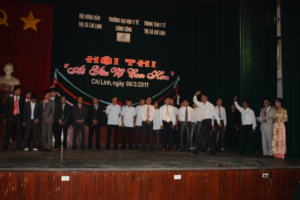
Teams of dads prepare to go head-to-head at the District Father’s contest, where men spoke up for breastfeeding
Our rural and urban breastfeeding activists embody WABA’s vision of a world where women are supported in all ways to freely exercise their right to breastfeed. They are the catalysts of our Warm Chain of Support for Breastfeeding that links change-makers at all levels to call for collective action and impact. With consistent messages, ongoing support and more skilled help during breastfeeding, all mothers will be empowered with a satisfying and effective breastfeeding experience.
We all have an important role to play in helping transform women’s lives to ensure the wellbeing and survival of children and women around the world.
For more information on our programmes contact:
Revathi Ramachandran, revathi@waba.org.my
